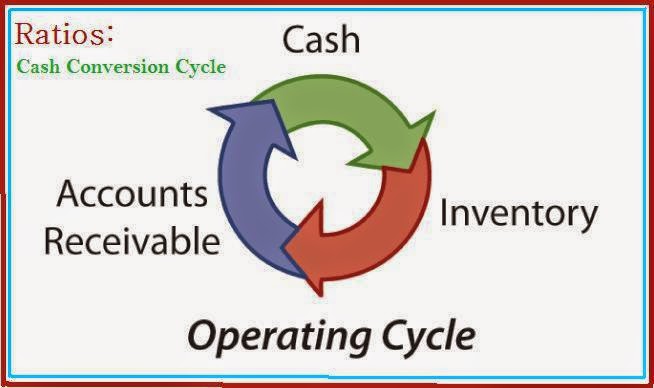----------------------------------------------------
Series : Ratio Analysis (19 th Post)
---------------------------------------------------
Q Is the company generating enough cash on time , from the sales of its inventory ?
This Cash Conversion Cycle or Operating Cycle
is an indicator in number of days a company takes to receive its cash from the
accounts receivable from the time purchase of its inventory.
Less Number of days means more Cash is
available quickly for additional purchases or repayment of its loans.
Formula: Operating Cycle Days or Cash
Conversion Cycle (CCC) = DIO + DSO – DPO
DIO=Days Inventory Outstanding
DSO=Days Sales Outstanding
DPO=Days Payable Outstanding
DIO is calculated as :
1. Dividing the cost of sales (income statement) by 365 to get a
cost of sales per day figure;
2. Calculating the average inventory figure by adding the year's
beginning (previous yearend amount) and ending inventory figure (both are in
the balance sheet) and dividing by 2 to obtain an average amount of inventory
for any given year; and
3.
Dividing the average
inventory figure by the cost of sales per day figure.
DSO is calculated as :
- Dividing net sales (income statement) by 365 to get net
sales per day figure;
- Calculating the average accounts receivable figure by
adding the year's beginning (previous yearend amount) and ending accounts
receivable amount (both figures are in the balance sheet) and dividing by
2 to obtain an average amount of accounts receivable for any given year;
and
- Dividing the average accounts receivable figure by the
net sales per day figure.
DPO is calculated as :
- Dividing the
cost of sales (income statement) by 365 to get a cost of sales per day
figure;
- Calculating the
average accounts payable figure by adding the year's beginning (previous
yearend amount) and ending accounts payable amount (both figures are in
the balance sheet), and dividing by 2 to get an average accounts payable
amount for any given year; and
Dividing the average accounts payable figure by the cost of sales per
day figure.
Next Post on Ratio Analysis: Cash
Flow Indicator Ratios
-------------------------------------------------------------------------
In my quest for learning value investing I came acrros this interesting
article and thought would like to share this with the community
Comments / Improvements and points worth considering are welcome
Google Feedburner is free & allows to
directly deliver any new post on this blog to your email .If you are
interested kindly enter your Email in the “Subscribe Via
Email” on the top left hand side of the navigation menu’s.
Related Articles

Understanding these facts on stock market trading as discussed here helps to understand market behavior in a better way. Also to increase the probability of earning high returns by trading in commodities always use experts suggested commodity tips while trading .
ReplyDelete